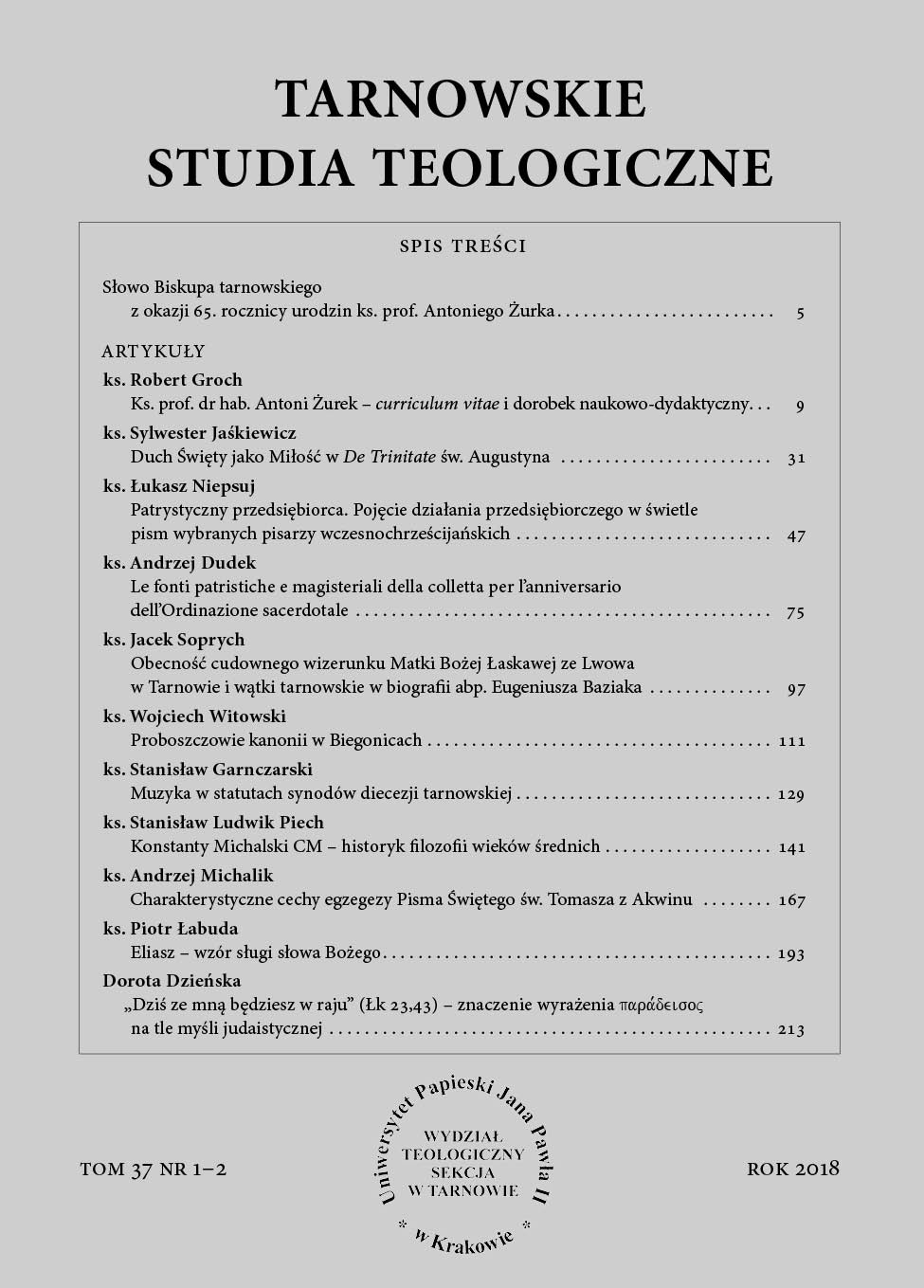Współpraca rodziny i szkoły w wychowaniu patriotycznym jako wyraz troski o prawidłowy rozwój postaw społecznych dziecka. Recepcja wniosków z badań dla wychowania patriotycznego
DOI:
https://doi.org/10.15633/tst.3264Słowa kluczowe:
patriotyzm, postawy społeczne, wychowanie, rodzina, szkoła, religijność, wartościAbstrakt
Niniejszy artykuł podjął próbę odpowiedzi na pytanie, jakie cechy psychiczne oraz jakie czynniki społeczne stanowią źródła patriotyzmu. Najpierw został zdefiniowany patriotyzm jako postawa człowieka, który ma pozytywne i zaangażowane nastawienie do własnego narodu, ale ma również nastawienie pozytywne do innych narodów. Badania empiryczne wskazały wiele źródeł patriotyzmu, z których najważniejsze to oddziaływania środowiskowo-społeczne rodziny, szkoły, wspólnoty religijnej, grup rówieśniczych i aktywność własna. Doniosłą rolę odgrywa również religijność człowieka oraz preferowane wartości, szczególnie te, które odnoszą się do dobra wspólnego. Wnioski z tych analiz podkreślają konieczność uwzględniania w wychowaniu patriotycznym dzieci poczucia wspólnoty z grupą oraz poczucia dobra wspólnego, które cenią i o które się troszczą. Nie można też pominąć treści religijnych, bowiem religijność jest mocnym oparciem dla patriotyzmu, z niej wypływa powinność moralna wobec ojczyzny i narodu. Różnice w uwarunkowaniach patriotyzmu u mężczyzn i kobiet pozwalają formułować potrzebę zwracania u chłopców uwagi na współpracę międzyosobową, pochwałę bohaterstwa i odpowiedzialnej pracy dla ojczyzny, natomiast w wychowaniu patriotycznym dziewcząt warto akcentować piękno polskiego krajobrazu, przyrody oraz dzieł kultury i sztuki. We wszystkich tych poczynaniach konieczna jest współpraca rodziców i nauczycieli, gdyż stanowią oni ważne dla dzieci autorytety, od których uczą się postaw społecznych, w tym również postawy patriotycznej.Bibliografia
Adamska K., Mapa rzeczywistości społecznej indywidualisty i kolektywisty – badania empiryczne, „Przegląd Psychologiczny” 3–4 (1997), s. 443–464.
Blok Z., Status teoretyczny kategorii: nacjonalizm, patriotyzm, kosmopolityzm i internacjonalizm, w: Człowiek i społeczeństwo, t. 11, Poznań 1994, s. 147–154.
Brzozowski P., Polska wersja Testu Wartości Rokeacha i jej teoretyczne podstawy, „Przegląd Psychologiczny” 2 (1986), s. 527–540.
Drwal R. Ł., Wilczyńska J. T., Opracowanie Kwestionariusza Aprobaty Społecznej, „Przegląd Psychologiczny” 3 (1980), s. 569–583.
Ferguson G. A., Takane Y., Analiza statystyczna w psychologii i pedagogice, Warszawa 1997.
Gough H. G., Heilbrun A. B., The Adjective Check List Manual, Paolo Alto 1965.
Gough H. G., Heilbrun A. B., The Adjective Check List Manual, Paolo Alto 1983.
Mądrzycki T., Psychologiczne prawidłowości kształtowania się postaw, Warszawa 1977.
Mika S., Psychologia społeczna dla nauczycieli, Warszawa 1998.
Prężyna W., Intensywność postawy religijnej a osobowość, Lublin 1973.
Prężyna W., Kryzys religijny a cechy osobowości, „Roczniki Filozoficzne” 1971 z. 4, s. 25–135.
Prężyna W., Skala Postaw Religijnych, „Roczniki Filozoficzne” 1968 z. 4, s. 75–89.
Rokeach M., The Nature of Human Values, New York 1973.
Sułek A., Psychologiczne uwarunkowania postaw wobec ojczyzny i narodu. Implikacje z badań empirycznych, w: Aspekt wychowawczy umiłowania Ojczyzny i Narodu w myśli Papieża Jana Pawła II. Materiały XVII Ogólnopolskiego Forum Szkół Katolickich. Jasna Góra, 30 listopada – 2 grudnia 2006, red. D. Domańska, Warszawa 2007, s. 80–89.
Sułek A., Psychospołeczne uwarunkowania patriotyzmu i nacjonalizmu, Kraków 2012.
Śliwak J., Osobowość altruistyczna. Osobowościowe korelaty altruizmu, Lublin 2001.
Wilczyńska J., Drwal R. Ł., Opracowanie Kwestionariusza Aprobaty Społecznej (KAS) J. Wilczyńskiej i R.Ł. Drwala, w: R. Ł. Drwal, Adaptacja kwestionariuszy osobowości. Wybrane zagadnienia i techniki, pod redakcją P. Brzozowskiego przy współpracy P. Olesia, Warszawa 1995, s. 57–66.
Wojciszke B., Postawy i ich zmiana, w: Psychologia. Podręcznik akademicki, t. 3: Jednostka w społeczeństwie i elementy psychologii stosowanej, red. J. Strelau, Gdańsk 2000, s. 79–106.
Pobrania
Opublikowane
Numer
Dział
Licencja
Autorzy publikujący w czasopiśmie udzielają jego wydawcy zgody o następującej treści:
- Autor zachowuje autorskie prawa majątkowe do utworu, a jednocześnie udziela wydawcy czasopisma zgody na jego pierwszą publikację w wersji drukowanej i wersji online na licencji Creative Commons Uznanie autorstwa 4.0 Międzynarodowe oraz zgody na wykonywanie opracowań, w tym przekładów.
- Autor ma możliwość udzielania zgody niewyłącznej na opublikowanie utworu w wersji, która ukazała się w czasopiśmie (np. zamieszczenia go w repozytorium instytucjonalnym lub opublikowania w książce), wraz z informacją o jego pierwszej publikacji w czasopiśmie.
- Autor może umieścić swój utwór online (np. w repozytorium instytucjonalnym lub na swojej stronie internetowej) jeszcze przed zgłoszeniem utworu do czasopisma.

